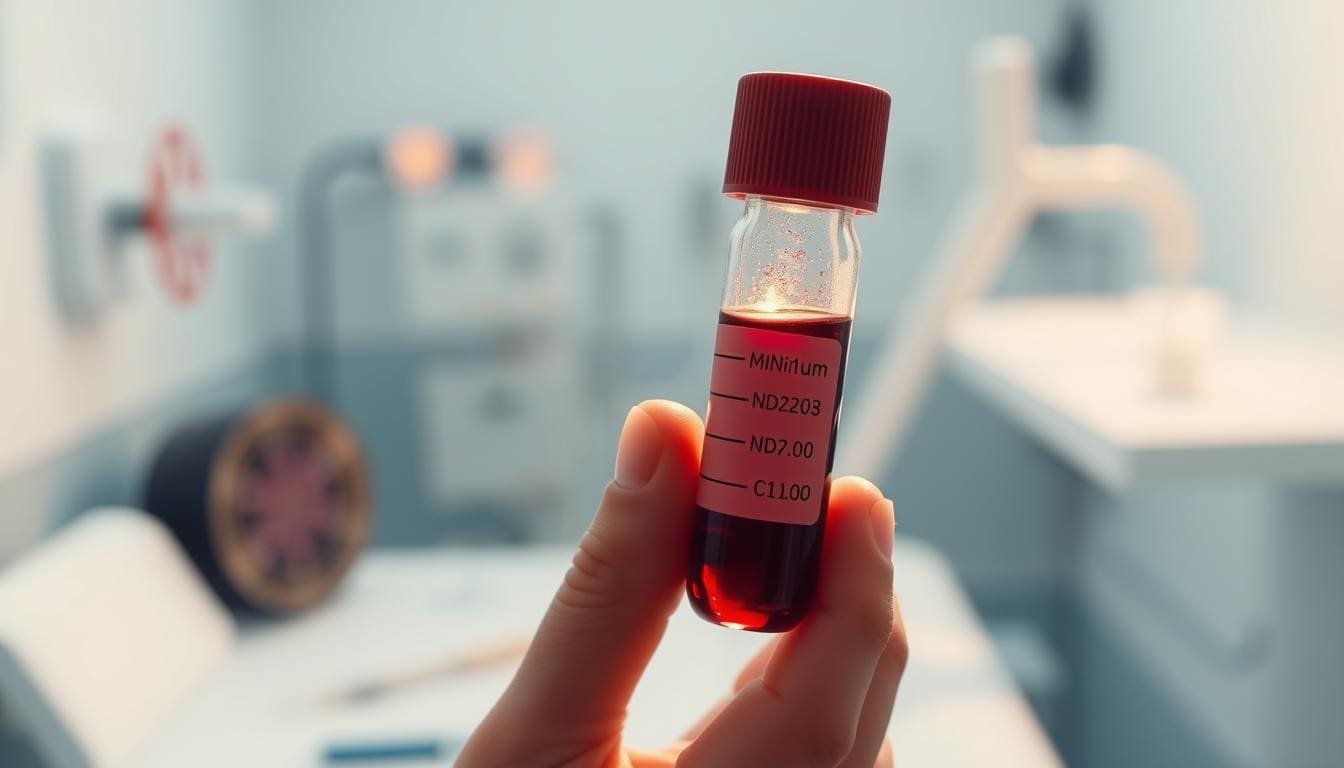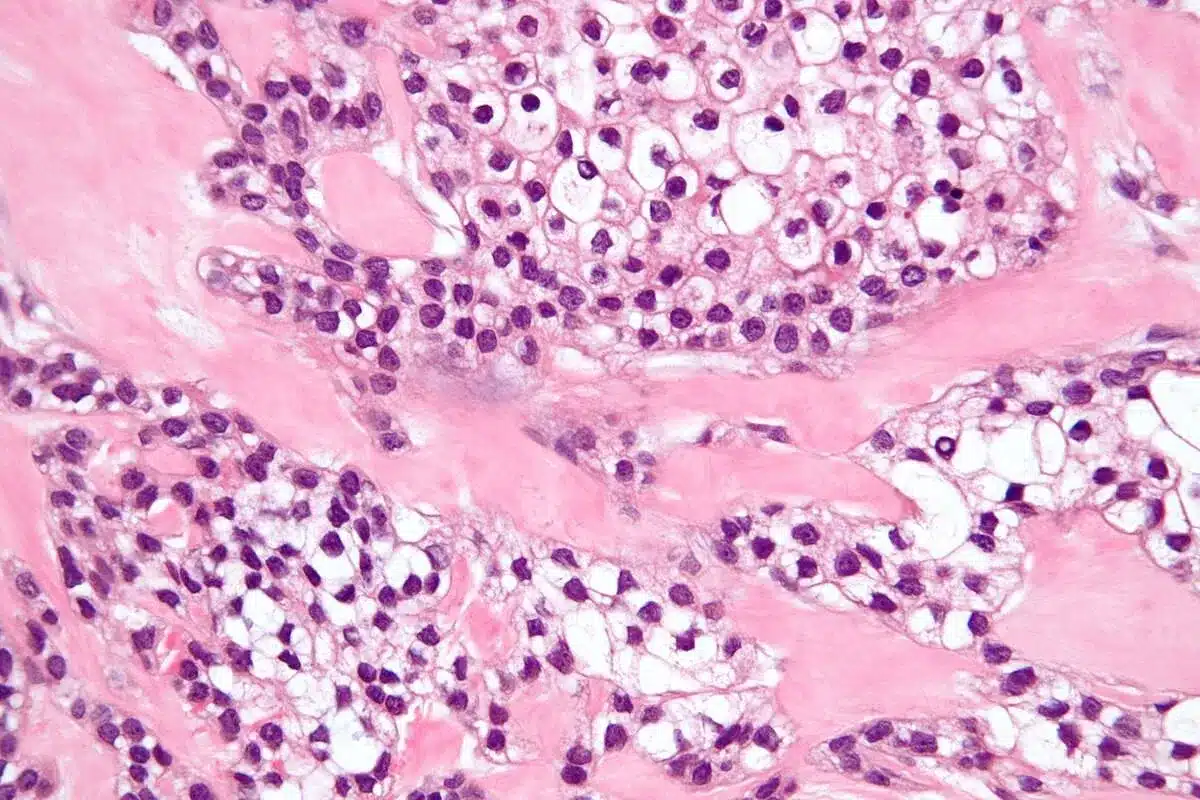
At Liv Hospital, we focus on the complex links between health issues and their effects. Anemia is when the body doesn’t have enough healthy red blood cells. This makes it hard for tissues to get enough oxygen. Find out how anemia can cause weight loss. Learn the serious facts on how low hemoglobin and iron levels impact your body.
Iron deficiency can cause a drop in oxygen delivery. This leads to fatigue, a reduced appetite, and a slower metabolism. All these factors can cause weight loss.
We know that iron deficiency anemia is a common problem. It makes people feel tired and short of breath. It’s important to understand how anemia affects weight loss to treat patients better.
Key Takeaways
- Anemia can lead to weight loss due to decreased oxygen delivery to tissues.
- Iron deficiency is a common cause of anemia.
- Fatigue and reduced appetite are symptoms associated with anemia.
- Iron supplements can correct iron deficiency anemia.
- Understanding anemia’s impact on weight loss is key to effective treatment.
Understanding Anemia and Its Types
Anemia is a condition where the body lacks enough red blood cells or hemoglobin. It’s not just one problem; it’s many. Knowing about anemia is key to finding and treating it. We’ll look at what anemia is, its types, and how common it is, focusing on iron deficiency anemia.
Definition and Classification of Anemia
Anemia means your body has too few red blood cells or they don’t carry enough oxygen. Hemoglobin is a protein in red blood cells that carries oxygen. Anemia types depend on the cause, red blood cell size, and hemoglobin amount. Iron deficiency anemia is the most common, caused by not enough iron.
Anemia types are based on red blood cell size. Microcytic anemia, often from iron deficiency, has smaller cells than normal.
Common Types of Iron Deficiency Anemia
Iron deficiency anemia happens when the body lacks iron for hemoglobin. It can come from not enough iron, needing more, or losing blood. Women with heavy periods are at high risk. Other causes include bleeding, poor diet, and certain health issues.
| Type of Anemia | Cause | Characteristics |
| Iron Deficiency Anemia | Insufficient iron intake or chronic blood loss | Small red blood cells, low hemoglobin |
| Vitamin Deficiency Anemia | Lack of vitamin B12 or folate | Large red blood cells, neurological symptoms |
| Anemia of Chronic Disease | Chronic diseases like cancer or HIV/AIDS | Normocytic or microcytic anemia, inflammation |
Prevalence and High-Risk Populations
Anemia is common worldwide, with iron deficiency being the main cause. The World Health Organization says 30% of the world’s population is anemic. Women and children are hit hard. Pregnant women, people with chronic diseases, and those eating too little iron are at risk.
Studies show iron-deficiency anemia often leads to unintended weight loss and changes in body shape. Knowing about anemia types and causes is key to solving these problems.
The Role of Iron in Body Function and Metabolism
Iron is vital for our bodies, playing a big role in metabolism. It helps make energy. Iron is key to making hemoglobin, a protein in red blood cells. This protein carries oxygen to our tissues.
Iron Metabolism and Storage Mechanisms
Iron metabolism controls how we absorb, transport, and store iron. Our bodies keep iron levels just right. This prevents too much or too little iron. Iron is mainly stored in the liver, spleen, and bone marrow.
Iron levels are managed by proteins and hormones. For example, hepcidin, made in the liver, helps control iron levels. Knowing how iron is managed helps us understand anemia.
Oxygen Transport and Cellular Energy Production
Iron is key to oxygen transport and energy production He Hemoglobin, with iron, carries oxygen to our tissues. This oxygen helps make ATP, our energy source. Without enough iron, we feel tired and can’t perform well.
Iron also helps in energy production. It’s part of the enzymes in the electron transport chain. So, having enough iron is vital for energy and health.
Optimal Iron Levels for Metabolic Health
Having the right iron levels is important for health. Too little or too much iron can cause problems. Iron deficiency leads to anemia, causing fatigue and weakness. Too much iron can damage tissues.
It’s important to keep iron levels balanced. Regular checks and management are key for those at risk of iron issues.
How Anemia Can Cause Weight Loss
Anemia makes it hard for the body to carry oxygen to tissues, which can lead to weight loss. This condition happens when there are not enough red blood cells or hemoglobin. It affects how the body works, including how much we weigh.
Decreased Oxygen Delivery to Tissues
Anemia means less oxygen gets to tissues and organs. This makes it hard for cells to make energy because they need oxygen to do so. As a result, the body’s metabolism can slow down, causing weight loss.
Oxygen delivery is key for the body to function properly. Without enough, people might feel tired, breathe short, and have other anemia symptoms.
Fatigue and Its Impact on Physical Activity
Fatigue is a big symptom of anemia. Feeling tired all the time makes it hard to do physical activities. This means less energy is used, which can lead to weight loss.
“Fatigue is one of the most common complaints among individuals with anemia, significantly impacting their quality of life and physical capabilities.”
Metabolic Rate Changes in Anemic States
Anemia can change how fast the body burns calories. Studies show that iron deficiency anemia might affect metabolic rate. This could be because of changes in thyroid function or how cells make energy.
| Metabolic Change | Effect on Weight |
| Decreased oxygen delivery | Potential weight loss due to impaired energy production |
| Increased fatigue | Reduced physical activity leading to weight loss |
| Metabolic rate alterations | Variable effects on weight depending on the nature of the change |
In summary, anemia can cause weight loss in several ways. These include less oxygen to tissues, more fatigue, and changes in how the body burns calories. Knowing how anemia affects weight is important for managing it.
The Connection Between Low Iron and Appetite
Anemia, caused by low iron, often leads to less hunger and weight loss. It affects millions globally, impacting daily life and health.
Appetite Regulation and Iron-Dependent Hormones
Iron is key in controlling hunger through hormones. One important hormone is leptin, which tells the brain when we’re full. Low iron can mess with leptin, changing how we feel hungry or full.
Leptin’s Role in Appetite Regulation:
- Leptin signals the brain about energy stores.
- Low iron levels can decrease leptin production.
- Reduced leptin can lead to decreased appetite.
Taste Changes and Food Aversions
Iron deficiency can make food taste bad. This is called dysgeusia and can make us eat less.
Taste Changes Associated with Iron Deficiency:
| Symptom | Description |
| Dysgeusia | Altered taste perception, making food less appealing |
| Metallic Taste | A persistent metallic taste in the mouth |
| Reduced Flavor Perception | Food tastes bland or unappetizing |
Digestive System Disturbances in Anemia
Anemia can cause nausea, constipation, and diarrhea. These issues can make us eat less and lose weight.
It’s important to understand how low iron affects appetite. By fixing iron levels, people can improve their hunger and nutrition.
Can Iron Deficiency Cause Weight Loss? Research Evidence
Research has shown a strong link between iron deficiency and weight loss. Iron deficiency anemia affects body weight and composition.
Clinical Studies on Anemia and Body Composition
Many studies have looked into how anemia affects body composition. People with iron deficiency anemia often see big changes in their weight and BMI. Treating iron deficiency anemia can improve metabolic functions and body measurements, like weight and BMI.
A study in a well-known medical journal found that anemic patients weighed less and had lower BMI than non-anemic ones. After iron treatment, their body composition improved.
Unintentional Weight Loss Patterns in Anemic Patients
Unintentional weight loss is common in anemia. Anemia’s fatigue and reduced oxygen to tissues can make people less active, leading to weight loss.
Anemia can also change appetite and taste, leading to poor nutrition and more weight loss. Doctors should think about anemia when patients lose weight without trying.
The “Anemic Skinny” Phenomenon Explained
The term “anemic skinny” describes people who look underweight or frail because of anemia. The exact reasons are complex, but chronic anemia may reduce muscle and fat, making them appear thin.
Studies show that treating iron deficiency can improve body composition and health. By addressing the cause of weight loss, doctors can help patients gain a healthier weight and better well-being.
Does Low Iron Affect Weight Loss Efforts?
Knowing how iron deficiency impacts weight loss is key for dieters. We often focus on diet and exercise for weight loss. But iron levels are also vital.
Iron is important for energy and metabolism. These are key to losing weight effectively.
Exercise Performance and Recovery in Iron-Deficient States
Iron deficiency can hurt our exercise performance and recovery. Without enough iron, we get tired easily. This makes it hard to keep up with exercise.
Iron helps carry oxygen to cells, which is needed for energy. Studies show that low iron deficiency can lower athletic performance and endurance.
Iron supplements can boost exercise performance in those with iron deficiency. This shows how important iron is for weight loss through exercise.
Metabolic Efficiency and Calorie Burning
Iron is also key to our metabolic health. It helps make thyroid hormones, which control our metabolism. Low iron can slow down our metabolism and calorie burning.
Research shows iron deficiency can lower resting metabolic rate. This makes it harder to lose weight. It’s important to keep iron levels up for a healthy metabolism and weight loss.
Challenges in Weight Management with Anemia
Anemia, often from iron deficiency, makes weight management tough. Fatigue from anemia can lower physical activity. Metabolic changes also affect calorie processing.
Some people with anemia may gain weight unexpectedly. This is due to inflammation or hormonal imbalances. It’s important to understand these challenges for effective weight management.
In summary, low iron can greatly impact weight loss. It affects exercise, metabolism, and overall weight management. It’s essential to ensure enough iron for those trying to lose weight.
The Paradox: Unexplained Weight Gain and Anemia
Anemia is usually linked with weight loss. But sometimes, it can cause unexplained weight gain. This is a puzzling medical paradox.
People with chronic inflammation or obesity might have both anemia and unexpected weight gain. This situation involves many body processes.
Chronic Inflammation and Anemia of Chronic Disease
Chronic inflammation can cause anemia of chronic disease (ACD). In this condition, inflammatory cytokines mess with iron levels. This makes it hard for the body to make red blood cells, even with enough iron.
This problem is common in those with long-term diseases like rheumatoid arthritis, cancer, or infections. The inflammation affects iron use and can also change weight.
| Condition | Effect on Iron | Weight Change |
| Chronic Inflammation | Disrupts iron homeostasis | May cause unexplained weight gain |
| Anemia of Chronic Disease | Makes iron unavailable for erythropoiesis | Can be associated with weight loss or gain |
Hormonal Imbalances and Their Effects
Hormonal issues, like thyroid problems, can affect anemia and weight. For example, hypothyroidism can cause anemia and weight gain because it slows down metabolism.
Hormonal changes can also influence hunger and how the body burns calories. This can lead to weight changes. It’s key to find and treat these hormonal problems to tackle anemia and weight issues.
Fluid Retention and Apparent Weight Changes
Fluid retention can also cause unexpected weight gain in people with anemia. Heart failure or kidney disease can lead to this. It can hide the actual weight loss from anemia.
Some might also have edema due to a lack of nutrients or chronic inflammation. This makes things even more complicated.
It’s important for doctors to understand these complex relationships. They need to create effective treatment plans for both anemia and weight changes.
Dieting and Weight Loss: Can Losing Weight Cause Anemia?
The link between dieting and anemia is complex. It involves nutritional deficiencies and how much we eat. Understanding how weight loss affects iron levels and health is key.
Nutritional Deficiencies in Popular Diet Plans
Many diets limit certain foods, which can cause nutritional gaps. For example, diets low in red meat or fortified cereals might not provide enough iron. Iron deficiency often happens in those on strict diets without enough iron-rich foods.
A study in the Journal of the Academy of Nutrition and Dietetics found that strict diets can lead to low nutrient intake, including iron. Below is a table showing iron intake in different diets.
| Diet Plan | Iron Intake Level | Risk of Anemia |
| Low Meat Diet | Low | High |
| Vegetarian Diet | Variable | Moderate |
| Fortified Cereal Diet | Adequate | Low |
How Caloric Restriction Affects Iron Absorption
Many diets cut calories, which can affect iron absorption. Low-calorie intake can slow down metabolism and reduce nutrient absorption, including iron. It’s important to balance calorie cutting with nutrient-rich foods to avoid this risk.
“Severe caloric restriction can lead to a decrease in the absorption of iron, potentially exacerbating or leading to anemia in susceptible individuals.”
Special Considerations for Menstruating Women
Women who menstruate are more likely to get iron deficiency anemia because of blood loss. They need to watch their iron intake and overall nutrition. Adding iron-rich foods like lean meats, beans, and fortified cereals to their diet can help.
Here’s data on iron intake for menstruating women on diets:
| Iron Intake | Menstrual Status | Risk of Anemia |
| Adequate | Regular | Low |
| Inadequate | Regular | High |
| Adequate | Irregular | Moderate |
In summary, dieting can help with weight loss, but it’s important to keep nutritional intake, like iron, adequate to avoid anemia.
Diagnosis and Treatment of Anemia for Weight Management
Understanding anemia diagnosis and treatment is key for those losing weight without trying. Anemia, like iron-deficiency anemia, can affect weight and metabolism. We’ll look at how to diagnose and treat anemia to manage its impact on weight.
Essential Blood Tests for Iron Status Assessment
To diagnose iron-deficiency anemia, several blood tests are needed. These tests check iron levels and blood health. The main tests are:
- Complete Blood Count (CBC) to check hemoglobin and red blood cells.
- Serum Ferritin to see stored iron levels.
- Serum Iron and Total Iron Binding Capacity (TIBC) to check iron in the blood and iron binding.
- Transferrin Saturation to see how much iron is bound to transferrin.
These tests give a full picture of iron levels. This helps doctors diagnose anemia and create treatment plans.
Iron Supplementation Strategies and Considerations
Iron supplements are often used to treat iron-deficiency anemia. The goal is to fill iron stores and boost hemoglobin. Here are some tips:
- Type of Iron Supplement: Oral iron is usually the first choice, with ferrous sulfate being common.
- Dosage: The right dose depends on the iron deficiency and the patient’s needs.
- Duration: How long to take supplements varies based on the cause of anemia and how well the patient responds.
It’s important to keep an eye on iron levels. Adjusting supplements is needed to avoid too little or too much iron.
Dietary Approaches to Optimize Iron Levels
Diet also plays a big role in managing iron-deficiency anemia. Here are some dietary tips:
- Eat more iron-rich foods like red meat, poultry, fish, beans, and fortified cereals.
- Boost iron absorption by eating vitamin C-rich foods with iron-rich foods.
- Avoid foods that block iron absorption, like tea, coffee, and calcium-rich foods, when eating iron-rich foods.
Combining these dietary tips with supplements can help manage anemia. This supports overall health and weight management goals.
Conclusion: Balancing Iron Levels for Healthy Weight and Energy
Understanding how anemia affects weight is key to managing weight. Anemia can cause weight loss due to poor nutrient absorption and less appetite. Yet, it can also lead to weight gain if fatigue makes you less active. Treating iron-deficiency anemia can boost your metabolism, energy, and health.
To manage weight with anemia, focus on good nutrition and medical treatment. Adding low-intensity exercises can help keep your energy up and prevent weight gain. Keeping iron levels balanced is important for a healthy weight and energy. By tackling iron deficiency and adopting a holistic health approach, you can lessen anemia’s impact on your weight and health.
FAQ
Can anemia cause weight loss?
Yes, anemia can cause weight loss. This is because it reduces oxygen to tissues, leading to fatigue. It also changes how the body uses energy.
How does iron deficiency affect weight loss?
Iron deficiency can affect weight loss. It reduces oxygen transport and changes how we feel hungry. It also impacts how efficiently we use energy.
Can low iron cause weight loss?
Yes, low iron can cause weight loss. It reduces oxygen delivery and energy production. It also affects our appetite.
Does being anemic make you lose weight?
Being anemic can lead to weight loss. This is due to less oxygen, fatigue, and changes in appetite and metabolism.
Can dieting cause anemia?
Yes, dieting can cause anemia. This is because it can lead to a lack of iron, vitamin B12, and folate.
How does caloric restriction affect iron absorption?
Caloric restriction can affect iron absorption. It reduces the intake of iron-rich foods. This can lead to not enough iron.
What are the effects of anemia on exercise performance?
Anemia can hurt exercise performance. It reduces oxygen to muscles, causing fatigue. It also decreases endurance.
Can anemia cause unexplained weight gain?
Yes, anemia can cause unexplained weight gain. This is due to chronic inflammation, hormonal imbalances, and fluid retention.
How is anemia diagnosed for weight management?
Anemia is diagnosed with blood tests. These include a complete blood count (CBC) and an iron status assessment. They check iron levels and anemia type.
What are the treatment options for anemia in weight management?
Treatment options include iron supplements, dietary changes, and addressing nutritional deficiencies. These help manage anemia and support weight management.
Can iron supplementation help with weight management?
Iron supplements can help with anemia symptoms. They improve energy levels. This supports weight management by optimizing iron levels.
How can dietary changes help manage anemia and weight?
Dietary changes can help manage anemia and weight. Eating iron-rich foods and vitamin C-rich foods enhances iron absorption. A balanced diet is also important.
Reference:
National Library of Medicine. (2023). Anemia. In StatPearls. Retrieved from https://www.ncbi.nlm.nih.gov/books/NBK499994








